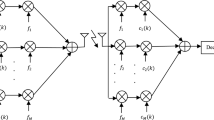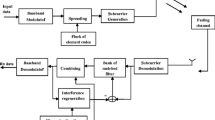Abstract
Complementary coded multicarrier code-division multiple access (CC MC-CDMA) has a strong potential to offer frequency diversity gain in frequency selective fading channels due to its ideal correlation characteristics. However, in uplink transmissions the use of single-user detection techniques will reduce the diversity gain achievable with complementary codes (CCs). Multiuser detection schemes such as successive interference cancellation (SIC) has a strong potential to overcome multiple access interference (MAI) in near-far environments. In this paper, SIC is analyzed in the context of improving the error rate performance of CC MC-CDMA operating under asynchronous uplink environments. The probability of error (POE) analysis for M-branch diversity system using alternate form of Q-function is derived and its performance is verified using SIC with maximal ratio combining (MRC) and minimum mean square error (MMSE) combining. The analysis of CC MC-CDMA systems under equal and unequal power variations is performed in asynchronous channel conditions and it was shown that considerable improvement in system capacity is achieved through multiuser detection.








Similar content being viewed by others

References
Selvaraj, K., Judson, D., GaneshKumar, P., & Anandaraj, M. (2020). Low Complexity Linear Detection for Uplink Multiuser MIMO SC-FDMA Systems. Wireless Personal Communications, 112, 631–649.
Adachi, F., Tomeba, H., & Takeda, K. (2009). Frequency domain equalization for broadband single-carrier multiple access. IEICE Transactions in Communication, 5, 1441–1456.
Hara, S., & Prasad, R. (1997). Overview of multicarrier CDMA. IEEE Communication Magazine, 35(12), 126–133.
Judson, D and Bhaskar, V. (2018). Error rate analysis of SIMO-CDMA with complementary codes under multipath fading channels. Wireless Personal Communications, 98(2), 1663–1677 (2018).
Meng, W. H., Sun, S. Y., & Chen, H. H. (2013). Multiuser interference cancellation in complementary coded CDMA with diversity gain. IEEE wireless Communication letters, 2(3), 303–306.
Chen, H. H., Chu, S. W., & Guizani, M. (2008). On next generation CDMA technologies; The Real approach for perfect orthogonal code generation. IEEE Transactions on Vehicular Technology, 57(5), 2822–3233.
Verdu, S. (1986). Minimum probability of error for asynchronous Gaussian multiple access channels. IEEE Transcations on Information Theory, 32(1), 85–96.
Cai, Y., & De Lamare, R. C. (2009). Space time adaptive MMSE multi user decision feedback detectors with multiple- feedback interference cancellation for CDMA systems. IEEE Transactions vehicular Technology, 58(8), 4129–4139.
AL-Fuhaidi, B. A, Hassan, H. E. A, and Salah, M. M. . (2014). Interference cancellation with space diversity for downlink MC-CDMA system. Wireless personal communication. https://doi.org/10.1007/s11277-013-1296-4
Judson, D., Bhaskar, V., & Selvaraj, V. (2018). Pre-Equalization Schemes for MIMO CC-CDMA Systems over Frequency-Selective Fading Channels”. Wireless personal Communication, 98(1), 1587–1603.
Ascar Davix, X., & Judson, D. (2019). Successive interference cancellation in asynchronous CC-CDMA systems under Rician fading channels. Telecommunication systems. https://doi.org/10.1007/s11235-019-00562-y
Judson, D., & Bhaskar, V. (2018). Interference cancellation in CDMA systems employing complementary codes under Rician fading channels. Wireless personal Communication, 101, 897–914.
Liu, Z., Guan, Y. L., & Chen, H. (2015). Fractional-Delay-Resilient Receiver Design for Interference-Free MC-CDMA Communications Based on Complete Complementary Codes. IEEE Transactions on Wireless Communications, 14(3), 1226–1236.
Sun, S.Y, Meng, W.X. & Chen, H.H. (2013) Uplink pre equalization for CC-CDMA systems under frequency selective fading. Proceedings of IEEE ICC. pp. 5317–5321.
Sun, S. Y., Hu, Y. L., Chen, H. H., & Meng, W. X. (2016). joint Pre-equalization and Adaptive combining for CC-CDMA systems over Asynchronous frequency selective fading channels. IEEE Transactions on Vehicular Technology, 65(7), 5175–5184.
Judson, D., & Bhaskar, V. (2019). Space Time Regularized Zero Forcing in Downlink Code Division Multiple Access Systems with Complementary Codes. Wireless personal Communication. https://doi.org/10.1007/s11277-019-06567-9
Judson, D., & Raj, A. A. (2016). Performance of multicarrier complementary coded CDMA under frequency selective Nakagami-m fading channels. Eurasip journal on wireless communication and networking, 67, 1–9.
Chen, H.H. (2007). The next generation CDMA technologies. John Wiley & sons.
Simon, M. K., & Alouini, M. S. (1998). A unified approach to the performance analysis of digital communication over generalized fading channels. Proceedings of IEEE, 86(9), 1860–1877.
Sun, J., & Reed, I. S. (1999). Performance of MDPSK, MPSK and non-coherent MFSK in wireless Rician fading channels. IEEE Transactions on Communication., 47(6), 813–816.
Wang, C., Au, E., Munch, R., Mow, W. H., Cheng, R., & Lau, V. (2007). On the performance of MIMO zero-forcing receiver in the presence of channel estimation error. IEEE transactions in Wireless Communication., 16(3), 805–810.
Author information
Authors and Affiliations
Corresponding author
Ethics declarations
Conflict of interest
The authors declare that they have no conflict of interest.
Ethical approval
This manuscript does not contain any studies with human participants or animals performed by any of the authors.
Additional information
Publisher's Note
Springer Nature remains neutral with regard to jurisdictional claims in published maps and institutional affiliations.
Rights and permissions
About this article
Cite this article
Starwin, M., Judson, D. & Selvaraj, K. Error Rate Analysis of Uplink MC-CDMA Systems using Complementary Codes in Rayleigh Fading Channels. Wireless Pers Commun 123, 69–83 (2022). https://doi.org/10.1007/s11277-021-09119-2
Accepted:
Published:
Issue Date:
DOI: https://doi.org/10.1007/s11277-021-09119-2



